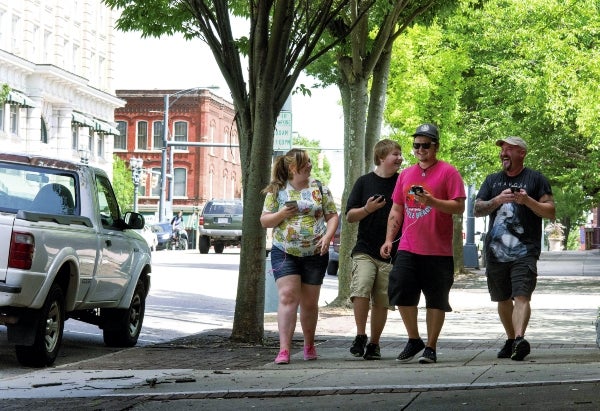Clyde, Time Was: The lines went down
Published 12:00 am Sunday, August 6, 2017

- Amethyst Eccles, Nicholas Worley, Jordan Worley and Charles Worley of Lexington look at their smartphone as scour downtown Salisbury looking for Pokemons in July 2016.
Time was when the lines went down.
On a sweltering summer solstice night without our friend “Juke Pyer,” it gives us time to reflect. Whilst the lineman frantically reattaches the labyrinth of connectors to the outside world, it suddenly doesn’t matter how many gigabytes we command, but the reality of how long we can last without air sets in.
We could all go in search of a cooler time and space. Please, not in your car with the engine on idle and the radio blaring and the A.C. cranking. That would be counterproductive.
Not long after the dark ages, but some time before the grid was up and going, we became dependent on an energy source. Without them we survived, miraculously. Power tools were the greatest boost to the labor force.
Amazingly, hand saws, hand drills, hammers and handmade bricks built America as we know it. Hand crafts supplied them and hard work kept them going. Today, both hands are texting feverishly. Pokemon and Pacman chasing right on their heels while you play with a fidget spinner and chew gum.
The doomsday vault is set up and ready for just this scenario. Even so, Lord, quickly come.
By the turn of the century, Mr. Bell came along so we could tell each other what a fix we were about to be in. Each phone had a line to the main switchboard in the telephone rooms in the Bell Blocks where Nina Clark, the first operator, would hook you up. E.B. Neave had the first phone. Oestreicher was number two.
A World War II era phone book cover says, “Keep the lines open for WAR BUSINESS.” The party line was perfect for eavesdropping until you were found out. This was obviously before privacy laws. Would you be afraid to let people hear what you now say on the phone? We would have less crime.
Phone etiquette is passé. Answering machines are the culprit. They own us. “Leave a message” makes it your fault for not talking to a real person. Why wait six rings when two would be enough if you are not home anyway? We don’t care if your options have changed. We don’t care if you are away from your desk. We don’t care if you are on another line. Just answer. Truth is, you are screening your calls. Call you back? Not if you are a city employee. Have a nice day!
A dwindling minority of souls are still off the grid. They seem to get along well. They eat in peace and quiet. They revel in intrinsic beauty and find it all around them in God’s world. They are not frantically thumbing their iPhone while driving or multitasking. They can hear music without plugs in their ears. They think everybody else is about to become unwired. Humanity is going down, clutching their Pandora’s box of lithium ion batteries on component circuit boards.
Being in the middle of nowhere is impossible these days. The feeling of being remote is extinct unless you’re David Freeze on a bike excursion. But how are we to meet people we don’t know? Introductions are a lost art.
Quoting Emily Post from 1922: “You should introduce anyone older, a woman or someone with a title first. Say, ‘May I present,’ in a formal setting. When introduced to a lady, she puts out her hand if he is someone she has heard about (not a stranger), and if no handshake is offered greet the woman respectfully. For a gentleman, a firm handshake is the proper form; too hearty is aggressive. Nothing could be more ill-bred than to treat curtly an overture made in spontaneous friendliness.”
What can we do to initiate interesting conversation, make new friends, learn a little history, talk about a book? We would walk into wet cement or one of the many projectiles along South Main Street — bike racks that come out of nowhere or way-finding signs creating pedestrian hazards— before we give up our cell phones.
Simply speaking to one another as you pass on the sidewalk is outdated. Know-it-all Yankees have changed that custom. Just a simple nod or a polite word of greeting will do.
The lines are down.
Clyde, who has legally dropped his last name, is a Salisbury artist.



